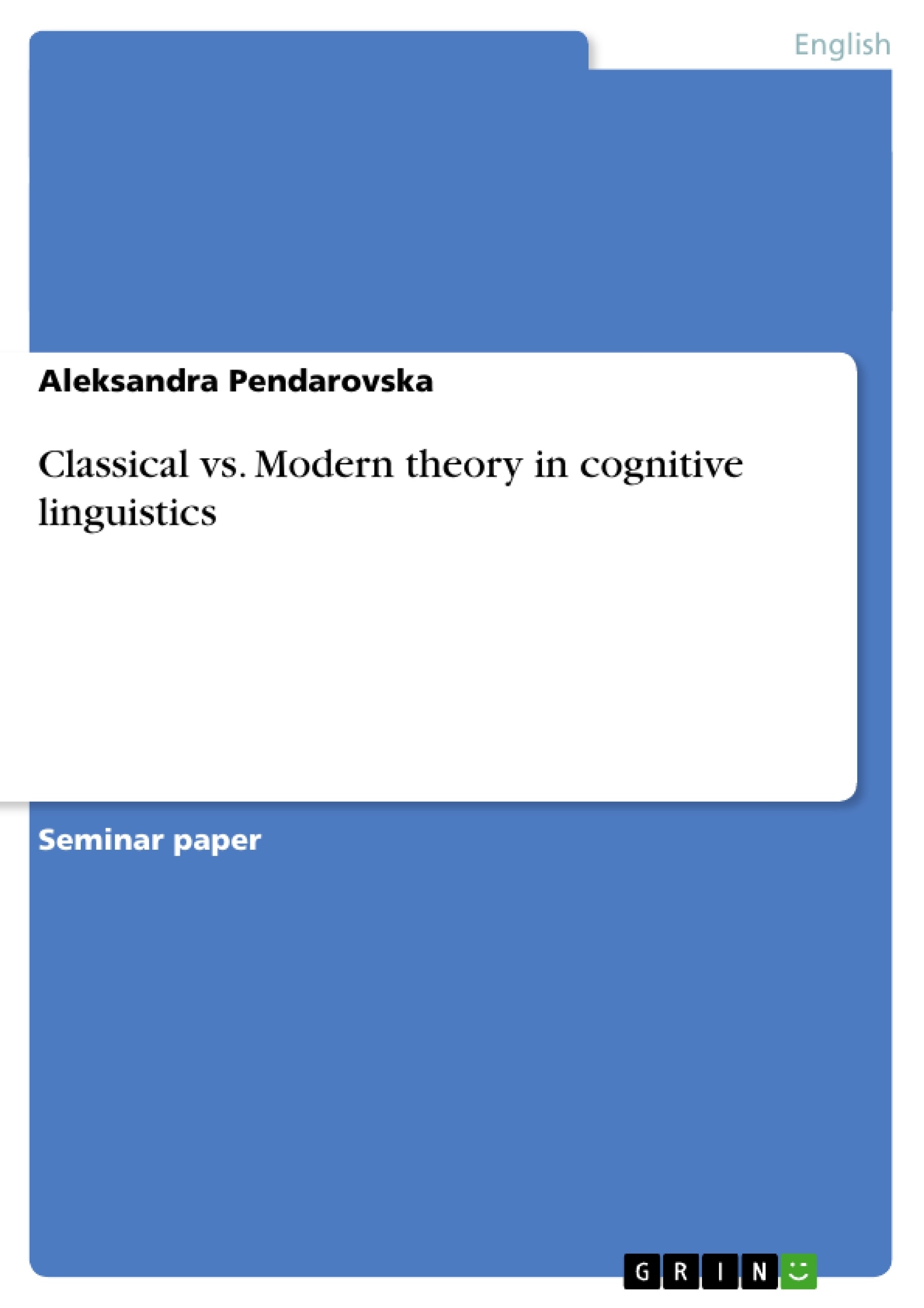Language, in general, has always been an intricate matter for research. In the course of development of the linguistics as a field of studies particularly dedicated to the task of exploring the language faculty and its features a lot of breakthrough discoveries have been made. With respect to the particular point of research, there are several subcategories of linguistics that are the direct result of the interactive research on a particular phenomenon. The cognitive linguistics is, doubtlessly, one of the few such linguistic branches, that is composed of the research fields of sciences such as: psychology, anthropology, philosophy and computer science. However, cognitive linguistics does not focus on particular features of language or particular parts of the grammar, but attempts to discover its interplay with perception of the world, that is, the reality that surrounds the human beings. In its characterisation of the language as part of the cognitive system and not an independent feature, the cognitive linguistics is in opposition to the generative linguistics and the Chomskyan postulation that language faculty is inborn. Moreover, Chomsky claims that language is “modular”, that is, it exists individually from the other cognitive faculties. The main aim of the cognitive linguistics is to discover the laws of structure of natural language categorisation as well as the intricate connection between language and thought. Terry Regier defines its function in the following manner: “In the domain of semantics in particular, cognitive linguistics seeks to ground meaning not directly in the world, but in mental and perceptual representations of the world“. (1996: 27) As the methodology and historical development of this field of studies are quite extensive, this paper will rather focus on the analysis of the main division of classical, also known as Aristotelian and modern theory. In the analysis of these two juxtaposed theories the pioneer work of the linguist William Labov and the psychologist Elisabeth Rosch would be taken into consideration. An emphasis would be put on Eleanor Rosch´s findings with respect to the extent of her contribution to the new ways of understanding categorisation of entities and clarification of certain aspects. Furthermore, some critical approaches of her findings would be regarded.
Inhaltsverzeichnis (Table of Contents)
- Introduction
- Linguistic categorisation
- Classical theory (objectivism)
- Modern theory (experiental realism)
- Labov's experiments
- Rosch's discoveries
- Conclusion
Zielsetzung und Themenschwerpunkte (Objectives and Key Themes)
This paper aims to analyze the main division of classical and modern theories of linguistic categorization in cognitive linguistics. It examines the pioneering work of linguist William Labov and psychologist Elisabeth Rosch, with a particular emphasis on Rosch's findings and their impact on understanding categorization. The paper also addresses critical approaches to Rosch's work.
- Categorization as a fundamental cognitive process
- Comparison of classical (objectivist) and modern (experiential realist) theories of categorization
- The role of prototypes and fuzzy boundaries in categorization
- Labov's experiments on linguistic variation
- Rosch's research on category structure and cognitive representation
Zusammenfassung der Kapitel (Chapter Summaries)
- Introduction: Introduces the field of cognitive linguistics, emphasizing its focus on the interplay between language and thought. It highlights the distinction between cognitive linguistics and generative linguistics, particularly regarding the nature of language faculty. The chapter emphasizes the importance of understanding categorization in cognitive linguistics.
- Linguistic categorization: Discusses the significance of categorization in human cognition, explaining how it allows for organizing experiences and understanding new entities. The chapter presents Jackendoff's perspective on the importance of categorization for cognitive psychology.
- Classical theory (objectivism): Explores the traditional view of categorization, which defines categories based on shared features and emphasizes clear boundaries between them. The chapter examines the assumptions of Aristotelian theory and its limitations in accounting for the complexities of categorization, including fuzzy boundaries and the interconnectedness of categories.
Schlüsselwörter (Keywords)
The paper focuses on key concepts related to cognitive linguistics, categorization, and the contrasting theories of objectivism and experiential realism. This includes terms like linguistic categorization, prototypes, fuzzy boundaries, cognitive representation, and the contributions of William Labov and Elisabeth Rosch.
Frequently Asked Questions: Cognitive Linguistics Categorization
What is the difference between Classical and Modern theory in cognitive linguistics?
Classical theory defines categories by shared features and clear boundaries (objectivism), while Modern theory (experiential realism) focuses on prototypes and fuzzy boundaries based on human perception.
Who are the key researchers mentioned in the modern theory of categorization?
The paper highlights the work of linguist William Labov and psychologist Eleanor Rosch as pioneers in understanding how humans categorize entities.
What are "fuzzy boundaries" in linguistics?
Fuzzy boundaries refer to the idea that the transition between categories is not always sharp. Some entities may belong more or less to a category, challenging the Aristotelian view of fixed categories.
How does cognitive linguistics differ from Chomskyan linguistics?
Cognitive linguistics opposes the idea that language is an independent, inborn "module." Instead, it views language as an integral part of the general cognitive system and perception of reality.
What is the role of prototypes in categorization?
Prototypes are the "best examples" of a category (e.g., a robin for the category 'bird'). Eleanor Rosch's research shows that human categorization often centers around these ideal members.
- Arbeit zitieren
- Aleksandra Pendarovska (Autor:in), 2004, Classical vs. Modern theory in cognitive linguistics, München, GRIN Verlag, https://www.grin.com/document/27936



